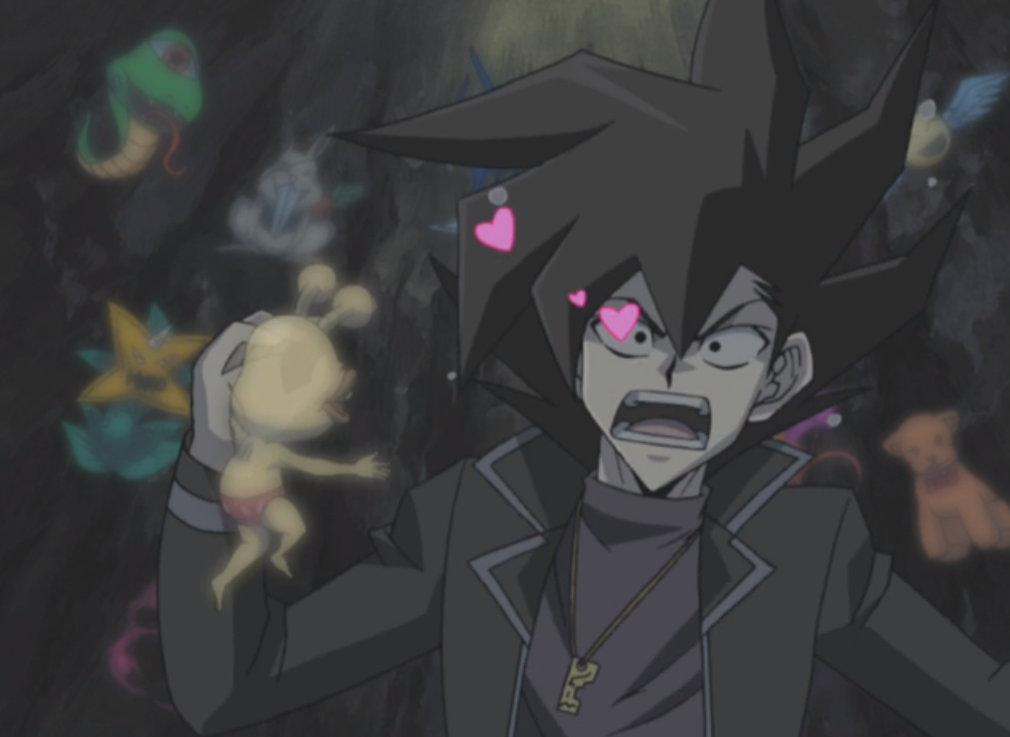Where Alexis represents the female students of Duel Academy, Chazz Princeton (Jun Manjome) initially epitomizes the male students of Obelisk Blue. As a scion to an organization run by a rich family, his older brothers set unreasonable expectations on him to win at all costs. The Princeton family sees their son dueling as an arm of their empire, with first son Slade and second son Jagger in the other heteropatriarchal institutions of politics and in finance respectively, not mere cultural enrichment like for girls. With financial support from his family and favoritism from Crowler, Chazz’s success reflects the privilege afforded to a male heir at a structural heteropatriarchy like Duel Academy. When lower class students like Jaden Yuki and Bastion Misawa publicly defeat him (in episodes 4 and 12 respectively) and he shifts to using common cards instead of power-based strategies, Chazz’s family retaliates for no longer fulfilling the gender role of their third son. Slade and Jagger Princeton go from providing him expensive cards in episode 25 to dueling him for ownership of Duel Academy in episode 35.
Chazz’s biological family doesn’t entirely cut him off nor vice versa (as he uses their funds to renovate the Slifer dorm in season 2), but he nonetheless takes on a “family of choice” with duel spirits in their place. Chazz’s life changes not only when he makes his way to North Academy in episode 24, only to return to Duel Academy as a student of Slifer Red, but meets his duel spirit partner Ojama Yellow. He reluctantly employs the grotesque and wimpy monster card to great success. In episode 35, Chazz reunites Yellow with his older brothers Ojama Green and Black by retrieving them from a well for trashed trading cards. In Japanese, the Ojamas call Manjome “aniki,” a term of endearment for a masculine senior meaning “older brother,” though he doesn’t refer to them as family in return like Jesse Anderson with his Crystal Beast partners. The dub leans into the gangster connotations of “aniki” with the Ojamas calling him “boss,” but the parallel between the two sets of brothers speaks for itself in any language.
Although the Ojama Trio refer to themselves as “brothers” and fuse together into Ojama “King,” in the Japanese version of episode 120 they describe themselves as “not men” when Manjome (Chazz) orders them to “fight like men.” Indeed, the Ojamas appear in both masculine and feminine outfits when they dress up for card effects, such as the old married couple tokens that pair with “Ojama Knight.” The Trio have equally weak abilities despite different body types, though Yellow’s large red lips and round bottom make him distinctly effeminate in design. Yellow also has a higher voice, provided by voice actress Mariko Nagahama in Japanese (making him the only of the trio played by a woman).
Yellow has more screen time than Green or Black as Chazz’s spirit partner and thus more instances of gender variance, which pairs with his more androgynous design. The English dub plays up his gender non-conformity with jokes implying same-gender love for Chazz, similar to the inserted dialog about Crowler’s ambiguous gender, such as offering to date him when Alexis rejects his romantic advances in episode 47. Yellow’s dialog in the dub of episode 88 uses double entendre to sound like he wants Chazz to “take him back” after a break up, when he actually wants brainwashed Chazz to remember his disregarded “Ojama” cards–enhancing the absurdity and silly tone of the whole situation. Japanese lines like Yellow complimenting Chazz in an elaborate “XYZ-Dragon Cannon” costume with “so manly!” doesn’t necessarily imply attraction, but does definitely exaggerate Yellow’s femininity by comparison.

Unlike the Princetons, the Ojamas don’t force masculine gender roles onto Chazz like demanding he be undefeated in Duel Monsters. After all, GX portrays the Ojamas themselves as weaklings in terms of attack points and effeminate in behavior. Uncanny humanoids wearing nothing but bikinis who go into hysterics in the face of danger as a character’s signature cards stand out among the fierce monsters, cute critters, or beautiful women of the Yu-Gi-Oh brand. The duel between Jaden and brainwashed Chazz in episodes 87 to 88 juxtaposes the Ojamas adopted into Jaden’s masculine “HERO” deck, as well as the literally chivalrous knight-themed cards of Chazz’s Society of Light deck.
Chazz initially finds the Ojamas off-putting and embarrassing, but eventually embraces them as part of his deck–and by extension, himself. In the Japanese version of episode 87, Judai (Jaden) goes so far as to say Manjome (Chazz) loves them. Even though he treats them roughly, they adore him back with admiration and physical affection. Utilizing the effeminate “Ojama” archetype, Chazz distances himself from the gender role passed down to him by his abusive brothers. He draws unique power from the genderqueer monsters everyone else writes off, who he only discovers by temporarily getting away from the heteropatriarchal institutions of the Princeton business and Duel Academy. Their gender non-conformity reflects Chazz’s new disposition and own gender variance, without Chazz necessarily being effeminate himself.
With that said, other parts of Chazz’s characterization reinforce heteronormative masculinity. He develops a crush on Alexis Rhodes at the end of his first school year, which only grows more obsessive over time. The infatuation emerges in episode 47, in which Chazz reflects on when Banner captured him and Alexis in vortexes of suspended animation. Chazz retroactively imagines her unconscious body superimposed with her smiling sweetly and he even dreams of her gazing upon him, putting his idealized version of her at odds with reality. In the English dub, he even fantasizes her confessing love to him. Alexis would never do so, but Chazz can project a mutual heterosexual desire between them because she was unconscious at the time.
Chazz goes on to declare his love for Alexis constantly and even joins the ranks of boys dueling for the right to date her in episode 47. As with Blair Flannigan, his passion for a member of “the opposite sex” reinforces his own assigned gender through the heterosexual matrix. In this case, Chazz’s heterosexual infatuation with a girl reinforces his male gender and masculinity. In the Japanese version of episode 47, Fubuki (Atticus) describes Manjome (Chazz) dueling Asuka (Alexis) as “putting his true, manly feelings on the line.” The same heterosexual infatuation occurs for Ojama Yellow toward the spirits of “Dancing Fairy” in episode 143, when he lies about seeing Jesse Anderson alive just to please the girls. Their crushes don’t bring out any particular manliness, as they lose any semblance of composure around them, but nonetheless reinforce male gender through heterosexual attraction.

The profiles for Chazz in the Tag Force video games suggest his social downfall led to his over-the-top expressions of infatuation. His initial description of “perhaps because of his high social status, he is very nice to girls, maybe even a bit of a feminist” refers not to ideological feminism but to chivalry, because the English term “feminist” means “gentleman” in a Japanese context. Once in a lower social status, he no longer acts like a gentleman with women. His Tag Force 2 profile states, “as for girls, he has been quite obsessed with Alexis for some time” instead to reflect this change. His obsession leads to love confessions, courtship attempts through dueling, and generally embarrassing himself. In an extra strip for the first volume of the Yu-Gi-Oh GX manga (which has a different continuity), author Naoyuki Kageyama describes the anime version of Chazz as “wacky” in contrast to his manga counterpart’s “cool guy” characterization, which comes through in his slapstick dynamics with the Ojamas as well as Alexis.
Chazz and Atticus’s interactions with Alexis bring out their eccentricities, and also imbue GX with misogynistic behavior through humor. In Chazz’s case, the comedic relief of his heteronormative crush on Alexis repeatedly draws attention to her gender variance of disinterest in romance. Even though Alexis remains single and refuses her brother’s propositions, Chazz and Atticus’s insistence keeps gender norms for women present in the story (as well as shows their disregard for Alexis’s autonomy). Grounding their behavior in comedy frames them as innocuous, albeit grating for her. While Chazz’s obsession with Alexis propels comedy, his fixation on Jaden propels the plot. At the end of episode 88 after breaking away from the Society of Light, Chazz surmises he joined the cult out of love for Alexis–when he actually did so out of desire to become a stronger rival against Jaden. While this pokes fun at the heteronormativity in his thought process, it also portrays a homosocial rivalry as vital but a crush (and by extension Alexis herself) as superfluous.
For the most part, GX integrates heterosexuality through humorous one-sided crushes without having to flesh out realized partnerships. Similar to Chazz’s shift in character, episodes 36 to 37 portray Bastion Misawa going from logical to head-over-heels for the statuesque “Amazoness” duel spirit Tania. His shift from diligent to lovestruck paired with Tania’s girlish flirtation that “contrasts” with her muscular character design make the duel comedic. By the time Bastion and Tania reunite and apparently become a couple in season 3, GX no longer dwells on their relationship (as it reduces Bastion’s screen time in general) and thus flattens it. More funny interactions wouldn’t suit the darker tone of season 3, compared to the drama of Adrian Gecko offering the life of his beloved attendant Echo to awaken Exodia in episode 145. With Echo sacrificed and Adrian later dead, their mutual heterosexual attraction doesn’t develop either.
Season 3’s higher stakes and graver atmosphere leaving little room for humorous relationships also applies to Chazz’s feelings for Alexis. They both become less prominent characters for the purposes of GX‘s Supreme King storyline, in which Jaden neglects his friends in favor of finding Jesse. Brron subsequently sacrifices them, along with other characters, for the creation of the “Super Polymerization” card in episode 136. In season 4 Manjome (Chazz)’s crush on her persists (seen in his desperation to pair up in a tag duel in 161 and blushing at her wearing a ballgown in episode 179) and continues to characterize him through the heterosexual matrix, but it does not factor into his post-graduation plans. Even though he frequently fantasizes about his idealized (feminine) Alexis, he does not imagine a future with her because the comedic nature of his attraction would not gel with the somber tone of GX’s last season.

Episodes 165 and 166, Manjome (Chazz)’s final focal episodes, instead look at his upcoming career in professional dueling through the male mentorship of Ed (Aster) Phoenix. He struggles to find a place in the industry without sponsorship, holding out from partnering with his family’s business. GX backtracks on his independence from his brothers by framing his decision as a matter of pride, planning to return to the Manjome Group only once he bootstraps enough as a pro to pay back his (presumably financial as well as emotional) debts to them. This adherence to patriarchal status quo unfortunately undercuts how Manjome proudly uses the “Ojama” archetype in the heteropatriarchal dueling leagues after refusing the business opportunity to throw matches and play them only for laughs.
Next time, we’ll look at a character portrayed in a much less heteronormative way.

6 thoughts on “Get Your Gender On: Chazz Princeton”